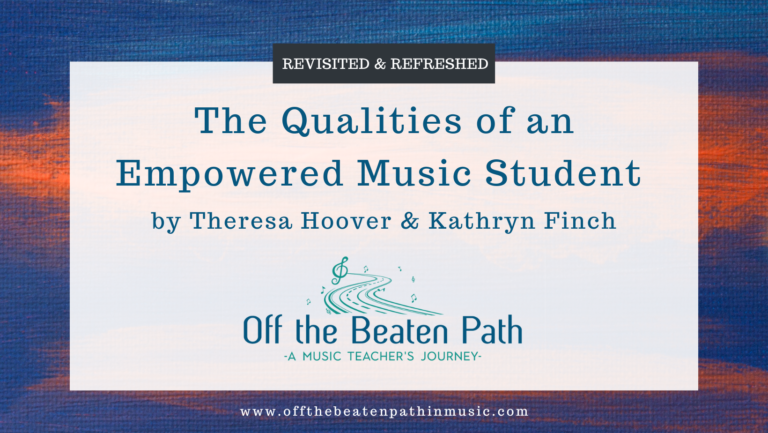Playing an Infinite Game
One of my favorite things in the summer is to catch up on all the books I purchased during the school year and didn’t have time to read. I buy them with the best intentions, but it will often take weeks or even months to finish reading one book.
In March, right before the world locked down for COVID-19, I saw Simon Sinek speak in Washington D.C. Simon Sinek is the author of several well-known books, though I knew him best for “Starts With Why.” The book talks about how the most influential and successful leaders have a firm understanding of their organization’s “why” and that contributes to their positive results. Sinek’s talk that I attended in March related to his most recent book, “The Infinite Game.” After seeing Sinek speak, I added it to my collection and finally read it this month. (You can also check out his TED Talk, “How Great Leaders Inspire Action,” for more information.)

You may question why, as a music teacher, I am reading books about leadership. I have no interest in administration, and no dreams of leaving education for the corporate world. However, I am fascinated by the ideas Sinek, and other prominent writers, discuss as many really do relate to education and music education specifically! “The Infinite Game” is no exception.
In the book, Sinek discusses two types of “games” – the finite game and the infinite game. In a finite game, there is a winner and a loser. There is a specific time frame, known players, and a definitive “end” to the game. Football is a great example of a finite game. In an infinite game, however, there is no winner or loser. As Sinek defines it, “In an infinite game, the primary objective is to keep playing, to perpetuate the game.”
When you think about businesses, these two types of “games” are prevalent. Some businesses play a finite game–their goal is to make a lot of money. To beat the competition. To “win” in their field. For other businesses, the goal is having customers for life. To continually make products their customers want and need. They don’t care about the competition. They focus on doing what they do at the highest level. I can think of several businesses who operate with each mindset, and I know which ones I would rather patronize!
We also see both games at play in music education. Those educators and schools playing a finite game are most concerned with “winning.” They work towards having a perfect performance, the most students enrolled in their programs, or the biggest trophy.
I argue that in music education we need to play an infinite game. While yes, there will be performances, assessments, recruiting, and more, the ultimate goal for our students should be to perpetuate the music – for students to become lifelong musicians. If we are playing with an infinite mindset, we still strive for excellence, but we focus on the big picture. The performance isn’t the only goal, and as a result, our role as teacher shifts. When the performance is no longer most important, we can devote time and energy into other areas of music.
Teachers don’t always have to be the one in front of the classroom with all the knowledge. The focus moves from being teacher-directed to student centered. Students become empowered in their music making and can take ownership of the process. They see value in what they do as musicians. They don’t rely on the teacher to provide all avenues for making music. When we teach with an infinite mindset, with a goal to continue the music making, we can easily help the students find this ownership along the way.
As you make plans for next school year, whatever that may look like, take time to think about your “why” for music education. Why are we teaching this to students? Why is it so important? Why did you want to become a music educator? Then think about this infinite game. If the goal is for students to “perpetuate the music,” how can we best help them achieve that?
The upcoming school year will be different, and it will be challenging. But with the right mindset, we can focus on what’s truly important and help our students play their own infinite game. Take this time to make a change. Since many of us are being forced to try something new, ask yourself how you can have an infinite mindset when teaching music. What can you do that will impact your students this year and beyond? What can you do to change the game?
If you’re looking for something to read this summer, I definitely recommend “The Infinite Game.” I imagine it will make you look at the world and your teaching a bit differently!



